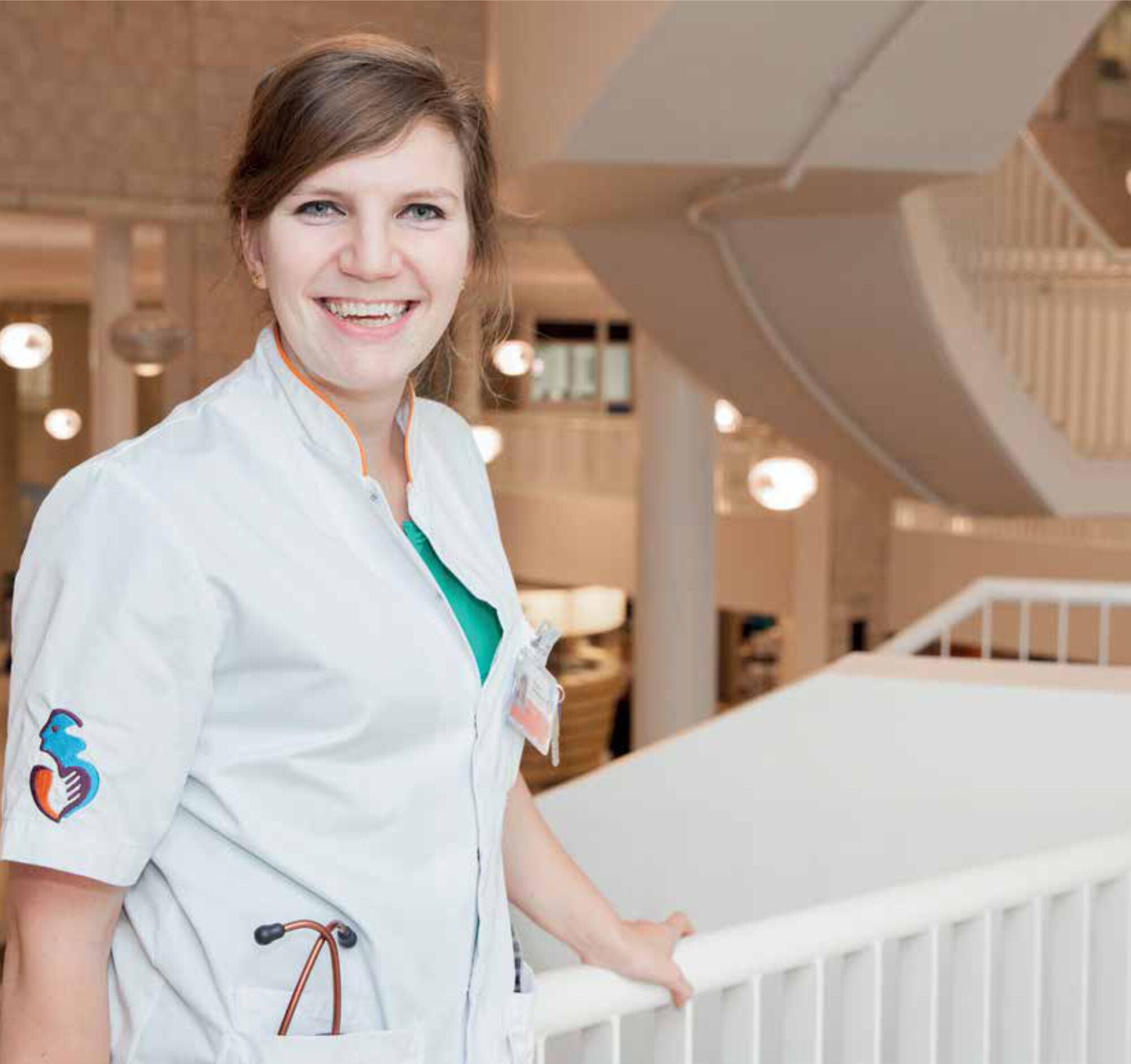Main content
This edition of MTb breaks with tradition. Instead of highlighting a particular field in global health as we normally do, the Editorial Board invited Heleen Koudijs (Medical Doctor Global Health in training) to be our guest editor. Heleen is one of the driving forces behind the Into the World project – the campaign aimed at public support for the training programme for medical doctors in Global Health and Tropical Medicine, an accredited programme that is endangered because of a lack of a sustainable funding base.
Heleen explains:
“The Netherlands has a long history of doctors practicing tropical medicine. The training programme on international health and tropical medicine – going back to the 1960s – gradually grew in professionalism, eventually resulting in its formal accreditation in 2012 by the Medical Specialties Council (‘College Geneeskundige Specialismen’). Accreditation however has so far not resulted in a sustainable financing base. In 2015, the former Minister of Health, Edith Schippers, decided not to provide government funding. She argued that trained doctors in global health and tropical medicine (Medical Doctors Global Health, AIGT in Dutch) would not contribute to the Dutch health care system, thus could not be funded from the same budget as the other medical specialisations. [See for background on the request to the Ministry of Health also the interview with Matthijs Botman elsewhere in this edition of MTb.]
Some two years ago, Matthijs Botman and Barend Gerretsen – together with Uitgeverij Boekschap and some enthusiastic NVTG members – started a project aiming to raise awareness for the work of global health doctors, explaining to a wider audience the profile of the Global Health doctors and outlining their work and contribution to the health system in the Netherlands and in low- and middle-income countries. The core of this project was the publication of a book containing the stories of twelve global health doctors and five vision articles.
It didn’t end there. The book was just the start of the wider social media campaign that was carried forward by a team consisting of global health doctors in training and medical students. We actively started to collect stories and posted them on the project’s website, Facebook page, Twitter and Instagram accounts, highlighting the broad spectrum of locations where global health doctors work and the various dimensions of their career. These locations included the Netherlands and high-income settings as well as places where they worked abroad.
| Triodos foundation Ted van den Bergh ‘The Netherlands has a long tradition of training ‘tropical doctors’, who have been able to widely spread their knowledge. There is a growing need for these experts in the field of international health and tropical medicine because of increased migration, globalisation and exchange between the Western world and low- and middle-income countries, especially since climate change is causing tropical diseases to spread northwards. We can’t let this expertise disappear because of lack of funding. That would be a terrible waste.’ |
It was not long before endorsements for the work of the global health doctor came in. In the summer of 2017, we received support from international experts such as Professor Rose McGready of the Shoklo Malaria Research Unit on the Thai-Myanmar border and Mr Stuart Ferguson, leader of the ‘Global Citizenship in the Scottish NHS’ movement.
One of the highlights of the campaign was the ‘Into the World’ public event on the 9th of December 2017, where the book Into the World was presented to an audience of over 400 stakeholders, including medical practitioners, supervisors, students, policy makers and NGO representatives.
| Global citizenship in the NHS Stuart Ferguson ‘It is morally correct for health workers from well-resourced health systems to stand together with counterparts in low- and middle-income settings, who battle daunting health challenges with precious little resource. But there is also a compelling pragmatic argument. As recent infectious disease outbreaks have highlighted, the health and safety of our populations depend – at least in part – on the functionality of healthcare systems far from our own. Our health systems and our health workers will also gain resilience, fresh perspectives, and new experiences in thinking and acting globally. We are one global village of interconnected and interdependent people who must work together to meet the health challenges of our time.’ |
The press was invited to attend, but serious media attention only took off some weeks later with the publication of two articles in the Dutch national newspaper ‘Trouw’. The articles examined the role of the global health doctor in international health and in low- and middle-income countries, and their contribution to the Dutch health care system. Other media channels picked up this message and asked why there was no sustainable funding for an apparently much needed training programme. Initially most attention was directed towards the role of the medical doctor global health for tropical diseases and preventive medicine. Soon other stakeholders, such as the hospitals involved in training global health doctors started to advocate too, highlighting the role in curative medicine and urging the government to provide funding.
| Médecins du monde/ dokters van de wereld chair ΤΟΝ Teunissen ‘Médecins du Monde advocates for continued investment in the training programme for Medical Doctors Global Health (AIGT in Dutch). The training programme is unique and offers doctors a solid base and opportunity to support other countries with their experience and expertise. They bring back to the Netherlands this unique expertise and their valuable experience of dealing with resource constraints. Working in the tropics is a unique speciality. We should not return to the days when doctors went abroad out of goodwill without a proper training. We need to encourage doctors to look beyond the walls of our health care system. It presents us with an opportunity to continue improving and optimising the health system in the Netherlands.’ |
In this MTb we provide a bird’s eye view of our campaign with a wide selection of snapshots of how international global health experts value the training programme and of how global health doctors themselves value their work experience abroad and how that relates to their current day-to-day work in the Netherlands.
Epilogue: the way forward
The campaign has picked up pace and continues to receive support from a variety of public, political and (global) health stakeholders. Public awareness of global health doctors is greater than ever, after several late-night talk-show appearances and a prime-time documentary episode of Floortje naar het einde van de Wereld, featuring a Dutch global health doctor in Papua New-Guinea. This media attention finally led to questions being asked in the Dutch Parliament and discussions are underway with the Ministry of Health (VWS) on funding options.
| Capa care ‘The recent West-African Ebola outbreak was an important wake-up call, demonstrating that failed health care systems may turn small epidemics into large global threats. In the same way as climate change demands international collaboration and solutions, many health issues demand similar international approaches. By spearheading programmes where the focus is to innovate, transform, improve and rationalize, often under very challenging conditions, the Dutch global health doctors are an important part of the development of healthcare systems in resource-poor countries, and build invaluable bridges to our Western health systems.’ |
The journey that started last year is far from over. With renewed vigour, the NVTG, the ‘Into the World’ campaign team and other stakeholders continue to build an evidence base for sustainable funding. You will find more information on our website and social media channels: www.artsinternationalegezondheidszorg.nl, and you are most welcome to join our advocacy!”
| Rose Mcgready ‘Global health doctors have profoundly influenced and inspired our work. They have a solid training in the basics and know how to implement these. They also have a goal to pass on their skills in our setting to those who missed out on training opportunities due to conflict as well as a vision to make a difference in the corner of the world where they work. I do not know of a country as generous as the Dutch in this area – the global health doctors are excellent ambassadors for the Netherlands.’ |
| Médecins sans frontieres / doctors without borders ‘The Medical Doctors Global Health train local staff and transfer practical knowledge and skills. They have been trained to do this in a culturally appropriate way. Global health doctors ‘think outside the box’ and look beyond the borders of their examination room and / or hospital. They are, for example, also advocates for equity in access to health for all.’ |
Irene de Vries
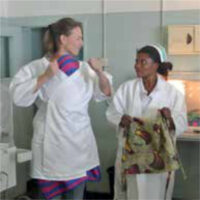
After working for two years as a medical officer in Saint Francis Hospital in Katete, Zambia, Irene worked for a year in obstetrics and gynaecology at the OLVG West in Amsterdam. ‘After a few months, I realised that this job was not my primary interest – maternal health in a low-resource setting. I knew then that I did not want to pursue a clinical career in the Netherlands. Recently I started working at KIT (Royal Tropical Institute) as advisor in sexual and reproductive health and rights (SRHR), with an emphasis on maternal and newborn care. At KIT my team supports governments and NGOs through capacity building, knowledge generation, and strengthening health systems in the area of SRHR. We work together with local partners in LMICs and – through qualitative and quantitative research – evaluate the efficacy of local programmes and interventions aimed at improving care.’
Jeanette van Os
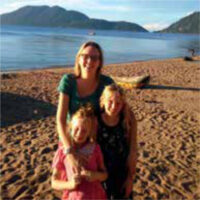
My work in the clinic includes seeing patients as a general practitioner. We also have a small ward for short-term admissions. Surgical and obstetric patients are referred to the community hospital in Monkey Bay, 25 km from our clinic. My work focuses mainly on HIV and consultations that I do in our HIV-clinic, where we treat patients with anti-retrovirals and provide long term follow-up. Additionally, I supervise the other doctors and nurses who do voluntary work in the clinic and residents from the Irish General Practitioner programme who can choose to do an internship in our clinic as part of their residency.’
Tessa Thiadens
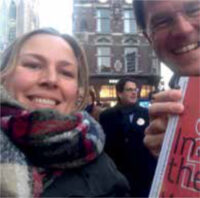
People often ask me if I don’t think working in elderly care is rather boring after having worked for Doctors without Borders in conflict zones. The answer is no. Whether it’s in South Sudan or Zoetermeer in the Netherlands, patients consult you with a question every day, and that’s what you deal with. There are actually quite a lot of things comparable in both settings. In both you deal with vulnerable people, work rurally, and lack specialist health care. There are no extensive diagnostic tests available, which requires creativity and flexibility.’
Josine Blanksma
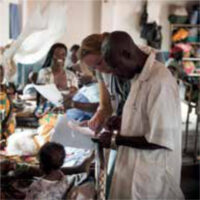
Josine Blanksma recently started working as general practitioner, having graduated from the AIGT/ MD Global Health programme in 2011. After completing her residency programme, she joined three missions for MSF (Médecins Sans Frontières) in South-Sudan, India and the DRC with a focus on care for severely malnourished children. During her last mission, she ran a popular blog and featured in a documentary about everyday life as a physician for MSF in Congo. Josine did the first year of her GP training on Texel. In the final year, she volunteered for the Boat Refugee Foundation (Stichting Bootvluchteling) on Lesbos, providing care for migrants. Since 2014 she has been a board member for MSF Netherlands.
Remko Schats
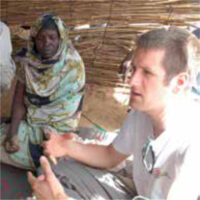
Remko Schats is a general practitioner and researcher. He started his career as global health doctor in 2003 and has been on three international missions since. In Chad he worked for Doctors Without Borders (MSF) as the only doctor in a camp serving 17,000 refugees from Darfur bearing both the physical and mental scars of a prolonged ethnic conflict. Missions for other organisations followed. Remko worked in Ghana in rural hospital and later as a clinical trainer for a post-tsunami malaria control initiative in Aceh, Indonesia. He returned to the Netherlands in 2007 and started training to become a general practitioner. Besides his work as GP, he has continued his efforts in global health as board member for the WHIG, a platform for family medicine and international health. From 2011 to 2014, Remko also carried out malaria vaccine research as part of his PhD programme at the University of Leiden in collaboration with Radboud University Nijmegen. He performed clinical trials immunizing and challenging healthy volunteers with live, deadly malaria parasites via bites of malaria mosquitoes. The outstanding nature of his work was recognized at the annual conference of The American Society of Tropical Medicine and Hygiene in 2013, where he won an award for clinical research.
Rinse Meester
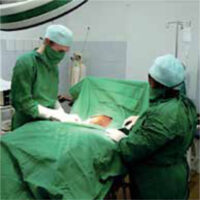
Rinse Meester worked from 2010 to 2012 as global health doctor in the rural North of Congo Brazzaville. Pokola, the little town in the jungle where he was based, has a medical health post offering medical facilities to 30,000 Congolese people. Rinse’s work consisted of diagnosing and treating (tropical) infectious diseases, supervising mother & child care, surgical procedures, conducting ultrasounds, hospital logistics, and out-of-hospital care for HIV patients. He was involved in local public health programmes aiming to prevent common infectious diseases such as malaria and HIV and was on local television and radio to raise awareness of these programmes. Rinse is currently back in the Netherlands, training to become an orthopaedic surgeon, and is in the fifth year of his residency. As a member of the Netherlands Society for International Surgery and the ‘G4’-alliance, he remains committed to marginalized populations.
Erik Staal
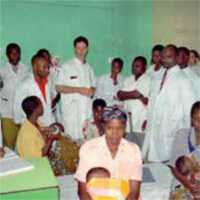
Erik Staal knew he wanted to become a global health doctor when he saw the father of his wife Jiska, global health doctor and surgeon himself, working in Sikonge, Sengerema in Tanzania. Erik completed his residency programme in Kennemer Gasthuis Haarlem and left with Jiska for Tanzania in 1998, where he would work for 5 years in Sengerema District Hospital. Here he focussed on surgery, orthopaedics and gynaecology. They returned to the Netherlands in 2003 as a family, and Erik started his specialty training to become a surgeon, first in Canisius Wilhelmina Hospital and later in Radboud UMC. He now works in Slingeland Hospital, Doetinchem, as trauma surgeon with a special interest in head/neck surgery. As a former board member of the foundation behind the training institute for global health doctors (OIGT) and as daily supervisor for the four global health residents during their surgical training, he is still committed to global health. Together with colleagues from Slingeland, Erik organizes two missions to Sengerema Hospital each year and supports local staff by treating and operating complex cases such as patients with neglected trauma, clubfoot and severe osteomyelitis. All participants are volunteers.
















































